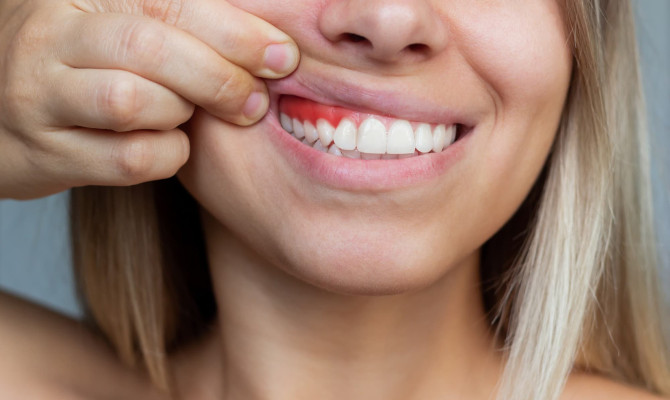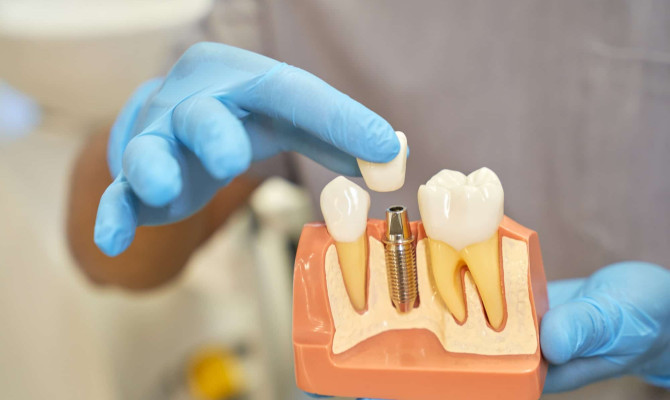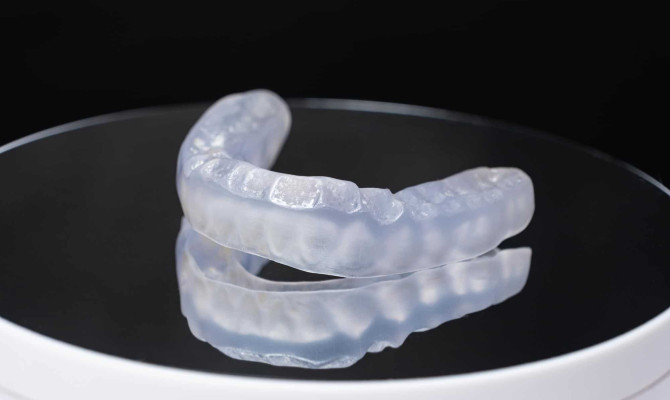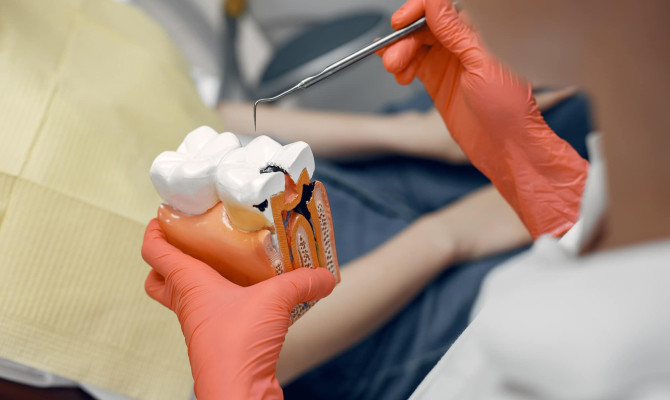Gingivitis : Causes and Management

- Gingivitis
- 16 Aug 2023
Overview
What is Gingivitis?
Gingivitis is an inflammation of gums. It often develops due to plaque accumulation on teeth and is frequently curable, especially with a dentist’s assistance and better dental hygiene. Gingivitis is a common condition that affects majority of adults at some point. It is a type of infection of the gums that usually only manifests as minor symptoms. This article discusses its signs, causes, risk factors, treatment, complications, and management.
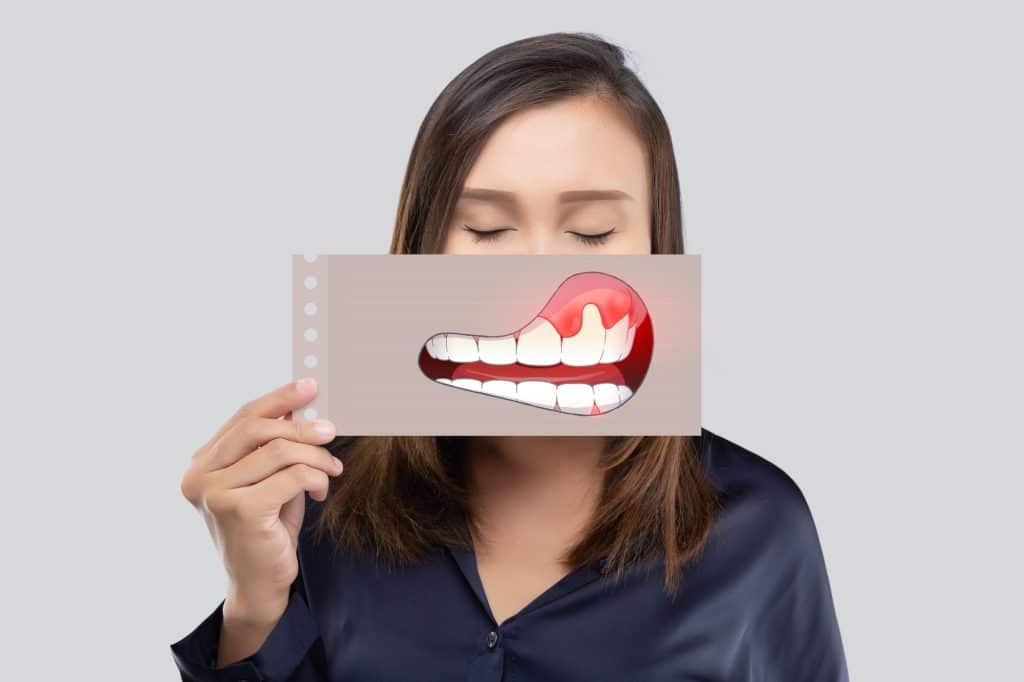
Types
What are the various types of gingivitis?
Based on their duration
- Acute gingivitis or necrotizing gingivitis (ANUG) develops unexpectedly, quickly destroys the gingiva, and occurs in individuals with compromised immune systems.1Types| Researched based study from Nlm.nih.gov
- Chronic gingivitis – is thought to be the most common form and is caused by plaque.
- Based on the cause, it could be –
- Plaque-induced type – is the most typical cause of gingivitis and is caused by dental plaque.2Types| Researched based study from Nlm.nih.gov
- Nutritional – A lack of vitamin C may be to blame for this.
- Hormonal changes – during adolescence and pregnancy may lead the gingival tissues to overreact to even a small amount of plaque buildup.
- Drug-induced – Many medications, including phenytoin, calcium channel-blocking drugs, anticoagulants, oral contraceptives, and vitamin A, can result in gingivitis as a side effect when used for systemic conditions.
Causes
What are the different causes of gingivitis?
Poor dental hygiene is a significant contributor to gingivitis because it promotes the buildup of plaque and calculus on teeth, which inflames the gum tissues nearby.
Plaque
- It is an invisible, clingy coating that forms on teeth whenever starches and sugars from food interact with oral bacteria. People should remove it every day since it quickly develops again.
Calculus or tartar
- It is formed when plaque on teeth’ surfaces solidifies beneath the gum line accumulating bacteria. The longer they are allowed to deposit on the teeth, the more irritated and inflamed the gums get3Causes| Researched based study from Mayoclinic.org
Symptoms
Symptoms of gingivitis
Gingivitis may show the following symptoms
- Enlarged gums.
- Dark red gums.
- Having bad breath.
- Gums that hurt when touched.
- Gums that bleed while brushing.
- Bleeding while eating apples or guavas.4Symptoms| Researched based study from Clevelandclinic.org
Risk factors
Risk factors associated with gingivitis
Gingivitis may have the following risk factors
- Genetic factor – a person’s risk of getting gingivitis increases if either parent or both parents have the condition. Example – hereditary gingival fibromatosis.
- Age – the chance of developing gingivitis is increased with age.
- Chewing tobacco or smoking cigarettes may raise the risk.5Risk factors| Researched based study from Nlm.nih.gov
- Nutritional deficiency – gingivitis is strongly associated with nutritional deficiencies, including a lack of vitamins C and D. 6Risk factors| Researched based study from Nlm.nih.gov ,7Risk factors| Researched based study from Nlm.nih.gov
- Low socio-economic conditions – may limit access to dental treatment.
- Hormone changes – can occur during adolescence, menopause, periods, and conception and may increase the risk of gum inflammation as the gums grow more sensitive.
- Medical conditions – diabetes, leukemia, other kinds of cancer, and HIV- are all linked to increased gingivitis.
- Dry mouth – many medical disorders and drugs can cause this and raise the danger of gingival inflammation.
- Drugs – like angina and epilepsy medications can also cause irregular gum tissue growth.
- Poor oral hygiene – gingivitis may result from poor oral care, including insufficient plaque removal with brushing and flossing.
- Mouth breathing during sleep may increase the likelihood.
- Developmental disabilities – Down’s syndrome, cerebral palsy, and other mental disabilities may increase a person’s chance of developing gingivitis because they make it difficult for them to maintain good dental hygiene.8Risk factors| Researched based study from Nlm.nih.gov
- Local factors – such as crowded or misaligned teeth, braces, and poor dental fillings, can enhance the likelihood of luring additional plaque.
- Psychological factors – Stress, sadness, anxiety, and other psychological issues can raise the risk.
Diagnosis
Diagnosis of gingivitis
To diagnose gingivitis, a dentist will ask a few questions about the symptoms one is experiencing and whether or not they are taking any drugs for any health concerns, followed by a physical examination
Oral examination – the dentist may look for
- Plaque buildup symptoms.
- The presence of tartar or calculus.
- Gum redness.
- Gum enlargement.
- Bleeding when probed.
- A probe to measure the depth of pockets.
- One or more loose teeth.
If they think there might be a medical disease causing the gingival irritation, they might also recommend additional tests.
Management
Management of gingivitis
By eliminating tooth plaque, gingivitis is primarily treated to reduce inflammation. 2Management| Researched based study from Nlm.nih.gov
These methods can be used to treat gingivitis
- Scaling and root planing is a professional cleaning technique used by a dentist or periodontist (gum specialist) to eliminate calculus and plaque from teeth and gums. Then, if necessary, they can show the patient the proper ways to brush their teeth, floss, and use an interdental toothbrush after explaining the value of maintaining good oral hygiene.
- To chemically lower the number of germs in the mouth and prevent plaque formation, they can recommend an antiseptic mouthwash containing chlorhexidine.
- If the medication the patient is taking is the cause of the gingivitis, the dentist or periodontist may recommend changing the prescription to improve the results of the disease’s therapy.
- The doctor may provide supplements if nutritional deficiency is the cause of gingivitis to reduce gingival inflammation.
- A dentist may remove a filling and replace it with a smooth surface to improve cleaning if damaged restorations or fillings bring on inflammation.
- Some forms of gingivitis, such as acute necrotizing gingivitis, may require the use of antibiotics such as metronidazole, tetracycline, clindamycin, and amoxicillin.
- In some circumstances, a periodontist may need to perform a surgical procedure called a gingivectomy to treat an overgrown gingiva.9Management| Researched based study from Nlm.nih.gov
Complications
What are the complications associated with gingivitis?
If untreated, it can worsen and lead to several issues, such as
- Gum infection returning.
- Periodontitis is inflammation of the jaw bones, the periodontal ligament, and other supporting structures.
- Abscess or infection of the jawbones or gums.
- Gum ulceration and bacterial infection are symptoms of trench mouth. 10Complications| Researched based study from Medlineplus.gov
- Declining gum line.
- Loss of bone surrounding teeth.
- Tooth loss.
- Lymph node swelling.
- Premature births and low birth weights can result from gingivitis in pregnant women.11Complications| Researched based study from Nlm.nih.gov
- It may raise the chance of cardiovascular disease, diabetes, stroke, rheumatoid arthritis, and respiratory illness.12Complications| Researched based study from Perio.org
Prevention
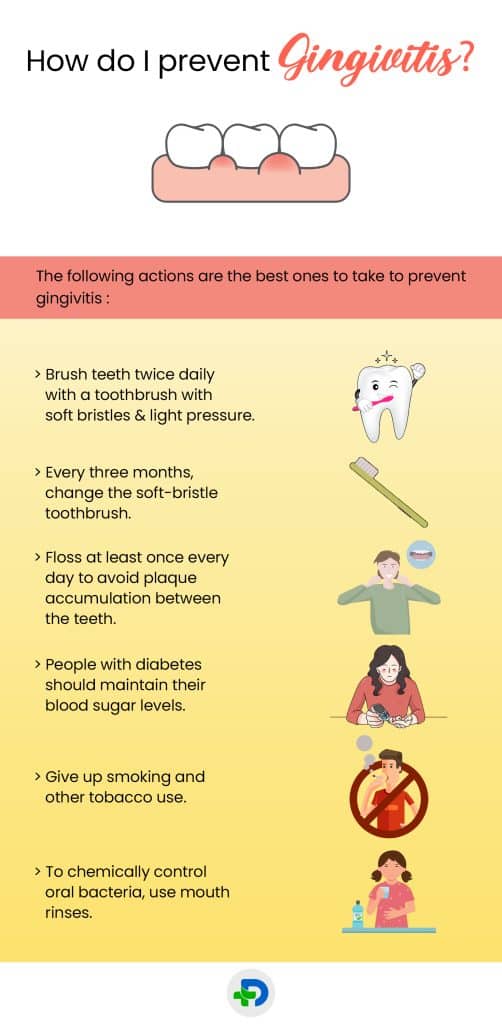
How do I prevent gingivitis?
The following actions are the best ones to take to prevent gingivitis
- Brush teeth twice daily with a toothbrush with soft bristles and light pressure.
- Every three months, change the soft-bristle toothbrush.
- Floss at least once every day to avoid plaque accumulation between the teeth.
- The dentist could recommend that patients more susceptible to gingivitis wash their teeth after each meal.
- People with diabetes should maintain their blood sugar levels.
- Give up smoking and other tobacco use.
- Learn proper brushing and flossing technique from a dentist or a dental hygienist.
- Use specialized plaque-removing tools like water floss, electric toothbrushes, or other tools if necessary.
- To chemically control oral bacteria, use mouth rinses.
- Get dental checkups and professional cleaning at least every six months. More vulnerable people require cleanings more frequently.
Prognosis
Prognosis of gingivitis
If gingivitis is diagnosed and addressed quickly and effectively, it is reversible, and the affected tissues may return to normal. If gingivitis progresses to become periodontitis, there will be a loss of connective tissue attachment and bone loss, which could ultimately lead to tooth loss. It is essential to practice good oral hygiene, to prevent infections of the gum from recurring throughout one’s life.
Any feedback on this article?
 This Articles content was accurate
This Articles content was accurate Very Informative Article
Very Informative Article I have a question or a comment
I have a question or a comment
 This article contains inaccurate content
This article contains inaccurate content This article was not helpful
This article was not helpful I have a question or a comment
I have a question or a comment
We appreciate your helpful feedback!
Checkout our social pages
References
-
National Library of Medicine
Acute Necrotizing Ulcerative Gingivitis | Types
-
National Library of Medicine
Gingivitis | Types
-
Mayo Clinic
Gingivitis | Causes
-
Cleveland Clinic
Gingivitis | Symptoms
-
National Library of Medicine
The Impact of Smoking on Gingiva: a Histopathological Study | Risk factors
-
National Library of Medicine
Gingival overgrowth caused by vitamin C deficiency associated with metabolic syndrome and severe periodontal infection: a case report | Risk factors
-
National Library of Medicine
The Relationship between Vitamin D and Periodontal Pathology | Risk factors
-
National Library of Medicine
Oral Manifestation in Mentally Challenged Children | Risk factors
-
National Library of Medicine
Different treatment approaches for the localized gingival overgrowths: Case series | Management
-
MedlinePlus
Gingivitis | Complications
-
National Library of Medicine
Relationship between maternal periodontal disease and low birth weight babies | Complications
-
American Academy of Periodontology
Gum Disease and Other Diseases | Complications













